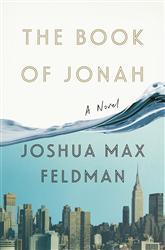Join a community of readers who are committed to Jewish stories
Sign up for JBC’s Nu Reads, a curated selection of Jewish books delivered straight to your door!
 Writers get asked a lot of questions about inspiration. Where do the ideas come from? How are characters created? Are plot twists or dramatic reversals invented or drawn from real life?
Writers get asked a lot of questions about inspiration. Where do the ideas come from? How are characters created? Are plot twists or dramatic reversals invented or drawn from real life?
If you ask a writer such questions, though, you’ll likely get some mealy-mouthed response about process and imagination versus articulation or something like that.
As a writer, I want to state that we aren’t trying to be evasive. There isn’t some secret website filled with great stories and crackling dialogue and compelling characters that you can pull from as soon as you get the URL and pay the membership fee. The truth is that inspiration is a mystery — and I think to some extent, the more time you spend writing, the more profound the mystery reveals itself to be. I can’t explain why when I go to sleep wrestling with some structural problem in a story, I’ll sometimes wake up in the morning with an elegant solution. I wasn’t consciously thinking about it; I wasn’t conscious at all.
Some part of our minds that sits outside of our awareness is at work on nights like that. And it’s this part of our minds that generally offers up the best ideas. But how to feed this shadowy part of ourselves? That, as they say, is the question.I think the best approach is to trust your instincts: surround yourself with art — books, movies, music, anything — that you like. And if you can’t say why you like it, all the better. Liking something without knowing why means that the invisible corners of our minds are singing its praises. When the time is right, they’ll send a message regarding why you like it, or at least what you ought to do about it.
 The origin of my novel, The Book of Jonah, was very much this sort of experience. The novel is a modern retelling of the biblical Book of Jonah, a text I liked a lot without being able to understand fully why. I’m interested in spiritual matters, but I’m not especially observant; there are other books in the Bible that provide more obvious material for a contemporary recreation. But there was something about the story of a man getting a message from God, ignoring that message, in the course of trying to escape it getting swallowed up and spat out by a giant fish, finally fulfilling his duties to great success, but ending up pretty grumpy about the whole experience nonetheless — something in that story inspired me. In many ways, writing of my novel was a way for me to answer the question of why I liked the Book of Jonah so much. What I discovered is that it speaks to the contradictions and quandaries of faith in the modern world with unusual clarity.
The origin of my novel, The Book of Jonah, was very much this sort of experience. The novel is a modern retelling of the biblical Book of Jonah, a text I liked a lot without being able to understand fully why. I’m interested in spiritual matters, but I’m not especially observant; there are other books in the Bible that provide more obvious material for a contemporary recreation. But there was something about the story of a man getting a message from God, ignoring that message, in the course of trying to escape it getting swallowed up and spat out by a giant fish, finally fulfilling his duties to great success, but ending up pretty grumpy about the whole experience nonetheless — something in that story inspired me. In many ways, writing of my novel was a way for me to answer the question of why I liked the Book of Jonah so much. What I discovered is that it speaks to the contradictions and quandaries of faith in the modern world with unusual clarity.
Typically, though, the path from inspiration to art is more circuitous. An image grows into a novel; a lyric in a song becomes a movie. Inspiration does not have to come exclusively from art, of course, either: a look, a texture, a certain slant of light — it’s all the stuff of words yet to be written.
One of the wonderful things about making art of any kind is that you appreciate how many sources of inspiration there are out there. You can find a hundred novels walking out your front door.